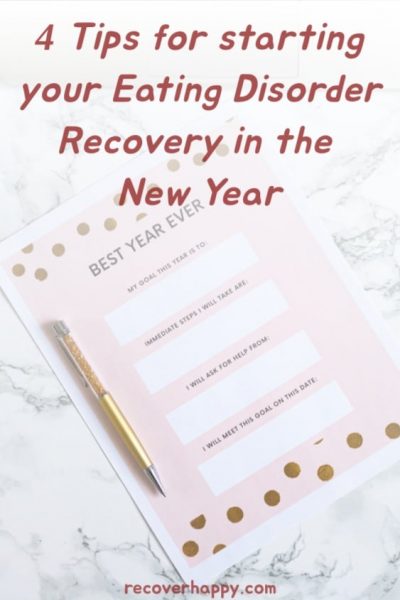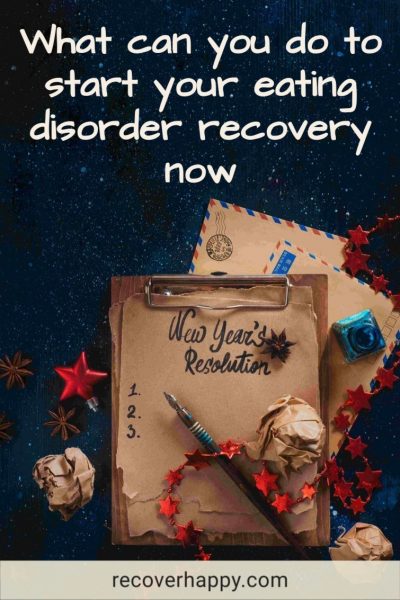4 tips to start your eating disorder recovery in the new year
By Tanja, Psychologist for Eating Disorders & Body Image

Usually, people tend to make New Year’s resolutions around issues such as their career, the direction of their lives, well-being or weight loss. If you are struggling with an eating disorder, making a New Year’s resolution can be an ideal way to start your eating disorder recovery.

Hi there!
I’m Tanja. I’m a qualified psychologist specialising in eating disorders, negative body image and body hate. I’m also a survivor of anorexia.
My mission is to help you to end your lifelong struggles with food and your body and inspire you to uncover and embrace you true worth. Read more…
Of course, you don’t need to think of your plan as a “New Year’s resolution” at all. Whatever you choose to call it, this time of year can be an ideal time to start your eating disorder recovery.
Ask yourself how you would feel at the end of the new year when you look back and you can say “I have finally started my eating disorder recovery”. Wouldn’t it be great to finally break away from your eating disorder?
Let’s take a look at how you could start your eating disorder recovery and make this year when you free yourself from your eating disorder.
Join the Body Acceptance & Food Freedom Collective
Receive a weekly dose of inspirations to help you make peace with your body and food.
Don’t worry, we hate spam too. You can unsubscribe any time.
Categories
Anorexia
Binge Eating Disorder
Bulimia
Intuitive Eating
Mindfulness
Orthorexia
Strategies for Recovery
1. Set clear recovery goals
One of the most important tools to start your eating disorder recovery, but also in life generally, is setting goals. Without having goals, you will just wander around aimlessly and won’t be able to measure any progress you have made. Setting goals helps you to stay motivated, gives you a sense of progress and makes you feel that you are moving forward.
So take some time for yourself, maybe make yourself comfortable on the sofa with a nice cup of tea or coffee and think about your ideal version of full recovery. Then write down what you want (not what you don’t want). Try to be as detailed as possible and do it in a way that makes you feel excited and optimistic about your future. Ask yourself what things would be like after you have made a full recovery:
- How would my life look?
- What kind of relationship would I have with food, my body and myself?
- How would I feel about myself?
- What would I see and think when I looked in the mirror?
- How would I describe myself?
- How would I feel around other people?
Be as clear as possible in your answers; the clearer you are about your vision of life after recovery, the easier it can be to make it come true in your daily life.
Read your answers every day. While you do this, try to create a picture of your future and try to feel the way you would feel as if this were already true. This should make you feel excited and amazing.

2. Get support to start your eating disorder recovery
Although recovery is an individual experience in many ways, getting support from your family, partner or friends can be very helpful and powerful to start your eating disorder recovery and during your journey.
Even though they might not know exactly how to help you, but just knowing that they love you and care about you and that you can lean on them when things get difficult can make such a difference in your recovery.
Your eating disorder wants you to keep everything secret and to be alone, as this gives it the most power and control over you. That’s why it is so important to open up about your situation. The more you talk about your issues with someone you trust, the less powerful your eating disorder will be.
I know it’s not easy to be fully open about your situation, but it will take so much tension and weight from your shoulders. At the start, just tell them that you are in recovery, what you are doing and ask them if they can be there for you when you need them. You could also tell them what you would like them to do and not to do.
3. Identify and get rid of habits that keep your eating disorder alive
A successful recovery requires making a lot of changes and letting go of habits that are keeping your eating disorder alive. Breaking free from bad habits can be difficult, as they are deeply ingrained behaviours that you might not even realise that you are doing it. However, the sooner you get rid of them, the less challenging your recovery will be and the better you will feel.
Try to identify what you are doing daily. Are you still engaged in your eating disorder behaviours, such as limiting yourself to certain nutrients and foods, frequently looking in the mirror, comparing your body with others on social media or weighing yourself daily?
Who are you following on social media; do the people you follow trigger any eating disorder behaviours?
What are you watching, reading, listening to that keeps your eating disorder alive?
Have a look in your wardrobe. Do you still have clothes that represent your eating disorder? If so, maybe have a nice day out with a friend to go and buy new clothes that represent the new, recovered you.
Take some time to monitor your daily habits and identify all aspects of your life that keep your eating disorder going and get rid of them.

4. Develop a healthy daily routine
Consistency and having a healthy routine is a very crucial part of your recovery, as they will help you to maintain a sense of purpose, keep you busy and reduce the temptation to fall back into eating disorder patterns. You will be better prepared for stress, which often is the cause of relapse, and you will begin to value yourself and love yourself for who you are, as you learn to prioritise your health and well-being.
There are various things you can start to do today to build a healthy routine.
A very powerful method is to keep a daily journal, which can help you if you are scared or confused or you need someone to talk to. Just writing down what’s on your mind can be so relieving and can help you to understand better what you are going through and clear your mind. Reading all the things you have written down will also enable you to come up with some possible solutions.
Getting enough sleep is also crucial to maintain physical, mental and emotional health. Try to set a regular bedtime and stick to it.
Practising meditation, intuitive eating or using affirmations can also keep you focused on your recovery.
After reading these tips, keep in mind that it is up to you to build a routine that works for you individually. Let’s be this the year you have started your eating disorder recovery!
You don’t need to struggle alone on your recovery journey.
Simply get in touch to discuss how I can help you.
It is entirely possible to overcome an eating disorder or body hate –
I have done it, others have done it and so can you!
Join the Body Acceptance & Food Freedom Collective
Receive a weekly dose of inspirations to help you make peace with your body and food.
Don’t worry, we hate spam too. You can unsubscribe any time.
You Might Also Enjoy...

Hi there!
I’m Tanja. I’m a qualified psychologist specialising in eating disorders, negative body image and body hate. I’m also a survivor of anorexia.
My mission is to help you to end your lifelong struggles with food and your body and inspire you to uncover and embrace you true worth. Read more…



